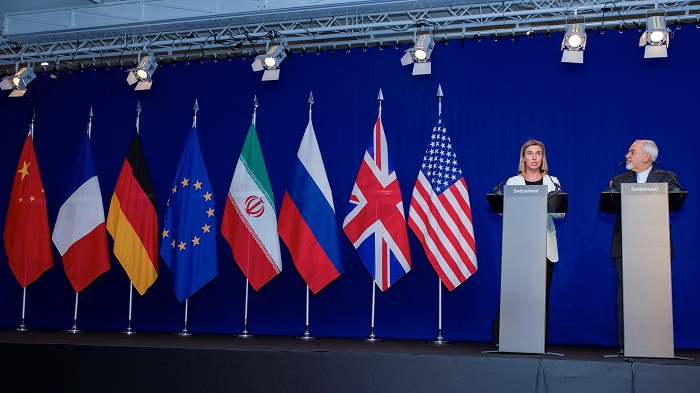Effective diplomacy helps open new chapters in foreign relations

Successful diplomacy is defined in terms of its ability to open new chapters in relations between countries, said an Iranian Foreign Ministry official.
'In other words, the main function of diplomacy is to open a notebook and place it in front of other people to fill its blank pages. This is what we are, and have been, doing successfully,' Fereydoun Haqbin, the director of the office for coordination and strategy of economic affairs of the Iranian Ministry of Foreign Affairs told the English-language newspaper Iran Daily.
He made the remarks on the sidelines of the three-day visit by Iranian Foreign Minister Mohammad Javad Zarif, accompanied by a trade and business delegation, to Pakistan during March 11-13, 2018.
Haqbin said Zarif's visit to Pakistan was aimed at using the great political capacity of the Iranian foreign minister to provide the country's trade sector with a larger number of opportunities.
The foreign ministry official noted that although the visit to Islamabad, prior to traveling to the southern Pakistani port city of Karachi, was aimed at achieving the objectives set as a part of intergovernmental relations between the two countries, 'We attended a very successful economic forum held in the Pakistani capital'.
He added fruitful business-to-business (B2B) negotiations were held, noting, moreover, a successful economic conference as well as B2B talks were held in Karachi.
Commenting on the degree to which the objectives of the trip have been fulfilled, Haqbin said, 'It is almost impossible to say that we managed to achieve all the goals we pursued during this visit given the greatness of the diversity of different aspects and dimensions of the relations between the two countries.'
When targets are set in mutual relations between countries, persistence and continuous effort are required to attain the goals, he stressed.
'This first step showed us that the Pakistani society is completely prepared to expand trade relations with Iran.'
He said close to 400 Pakistani traders willing to cooperate with their Iranian counterparts attended the economic forum in Karachi which is the South Asian state's main trade center and economic capital.
'The greatness of the number of Pakistani traders who were willing to attend the Karachi forum was to the extent that many of them failed to participate in this meeting. This forum helped Pakistani traders and businessmen realize the extent of the two countries' trade capacity to expand economic cooperation and that the ground is completely prepared to make use of this huge potential.'
He said economy-wise, this visit was quite successful, adding however, that was [not] the whole story.
Haqbin noted that Pakistan's economic community is well aware that the government of the country is required to pay greater attention to the interests of this society.
The official said there are a number of banking bottlenecks hindering trade between Iran and Pakistan, which is a fact currently acknowledged by the Pakistani government as well as the country's banking system and economic society.
Currently, he added, Pakistani officials and authorities have come to the conclusion that they should take the issue of implementing the preferential trade agreement signed between the two countries a few years ago, more seriously.
Haqbin said the two countries have also signed a bilateral currency swap agreement, the implementation of which should have begun since a year ago, adding Iran and Pakistan have concluded that their national banks' capacity can be used to make it possible for them to use their currencies in their mutual trade.
Commenting on the new strategy of the Iranian Ministry of Foreign Affairs to focus its attention on economic sector, he said this ministry decided to modernize its organizational chart based on the country's new priorities following the signing of the Joint Comprehensive Plan of Action between Iran and P5+1 in July 2015.
Haqbin added these priorities were identified based on the country's needs.
He said the Foreign Ministry's move to become more agile, flexible and organized was made within the framework of undergoing such transformations and changes.
Prior to this, the country's Vision 2025 document had been drawn up as a national strategy which did not garner much attention in the process of being implemented, Haqbin noted, adding following the submission of this document, 'resistance economy' policies were introduced by the Leader of the Islamic Revolution Ayatollah Seyyed Ali Khamenei as a more profound strategy.
The implementation of 'resistance economy' policies created the necessity to carry out an extensive review of the trend of economic activities in all domestic bodies, organizations and apparatuses, including the Ministry of Foreign Affairs, he said.
Haqbin added comprehensive studies were conducted to duly respond to this priority which was making the country's diplomacy more economy-oriented.
He said that moves to this end included the present shift in the focus of the Iranian Ministry of Foreign Affairs to economic issues, transformation in the ministry's structure and the changes in its organizational chart.
Haqbin listed the Foreign Ministry's strategic targets to expand or engage in trade with as Iran's neighboring states, world's major economies which do not express hostility toward the Islamic Republic, newly emerging economies and markets in which Iranian products would be able to compete with their foreign counterparts.
Source: IRNA

